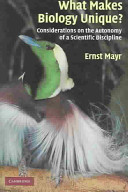Individuals VS Species
The assumptions of population thinking are diametrically opposed to those of the typologist. The populationist stresses the uniqueness of everything in the organic world. What is true for the human species,–that no two individuals are alike, is equally true for all other species of animals and plants ... All organisms and organic phenomena are composed of unique features and can be described collectively only in statistical terms. Individuals, or any kind of organic entities, form populations of which we can determine the arithmetic mean and the statistics of variation. Averages are merely statistical abstractions, only the individuals of which the populations are composed have reality. The ultimate conclusions of the population thinker and of the typologist are precisely the opposite. For the typologist, the type (eidos) is real and the variation. an illusion, while for the populationist the type (average) is an abstraction and only the variation is real. No two ways of looking at nature could be more different.
Notes:
Species are classified according to a mean, the perspective is to ignore the variation within the species.
Folksonomies: taxonomy perspective
Taxonomies:
/science/biology/zoology/endangered species (0.510912)
/society (0.347625)
/pets/reptiles (0.320817)
Keywords:
VS Species Species (0.923102 (neutral:0.000000)), merely statistical abstractions (0.879403 (negative:-0.430806)), arithmetic mean (0.766876 (neutral:0.000000)), form populations (0.749217 (neutral:0.000000)), organic world (0.723073 (positive:0.369100)), population thinker (0.721727 (positive:0.318007)), ultimate conclusions (0.719375 (positive:0.318007)), unique features (0.717513 (neutral:0.000000)), organic phenomena (0.706224 (neutral:0.000000)), (eidos) is real and the variation. an illusion, while for the populationist the type (average) is an abstraction and only the variation is real. (0.704889 (neutral:0.000000)), human species (0.703957 (positive:0.397590)), organic entities (0.699834 (neutral:0.000000)), statistical terms (0.696468 (neutral:0.000000)), variation (0.684616 (negative:-0.203528)), individuals (0.624473 (negative:-0.282219)), typologist (0.524363 (negative:-0.132093)), uniqueness (0.423789 (positive:0.369100)), assumptions (0.420530 (negative:-0.450100)), opposite (0.398055 (positive:0.318007)), organisms (0.387845 (neutral:0.000000)), Averages (0.387032 (negative:-0.430806)), illusion (0.385863 (positive:0.439589)), perspective (0.384247 (negative:-0.505016)), kind (0.380471 (neutral:0.000000)), animals (0.375208 (positive:0.450412)), plants (0.375125 (positive:0.450412)), ways (0.373085 (negative:-0.518952)), nature (0.372913 (negative:-0.518952)), reality (0.372311 (negative:-0.282219))
Concepts:
Biology (0.978626): dbpedia | freebase | opencyc
Arithmetic mean (0.962804): dbpedia | freebase
Mean (0.804991): dbpedia | freebase
Average (0.780784): dbpedia | freebase
DNA (0.740188): website | dbpedia | freebase | yago
Mode (0.734885): dbpedia | freebase
Organism (0.700424): dbpedia | freebase





